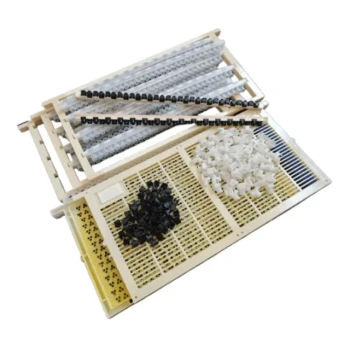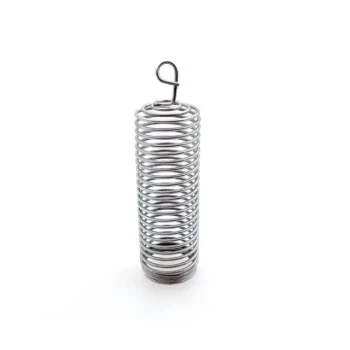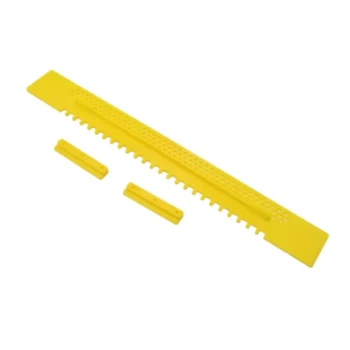At the heart of modern beekeeping is the nucleus colony, often called a "nuc." It is a small, self-contained starter hive that includes all the essential elements of a full-sized colony: a mated and laying queen, several thousand worker bees, and frames containing developing bees (brood) as well as food stores of honey and pollen. Housed in a small box, it is a fully balanced, miniature colony ready for growth.
A nucleus colony is not just a collection of bees; it's a complete, functioning ecosystem in miniature. Its primary advantage is that it gives a new hive a significant head start, making it a powerful tool for both starting a new apiary and managing existing ones.
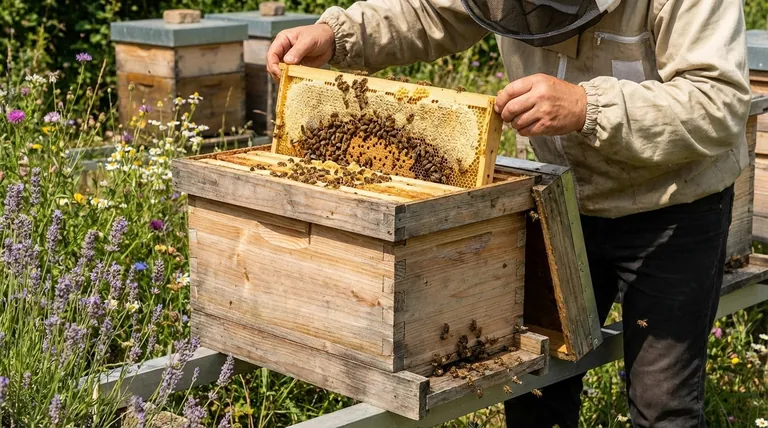
What Defines a "Complete" Nucleus Colony?
A nuc's value comes from its balance. While a standard hive may have ten frames, a typical nuc has three to five, but those frames contain everything needed for the colony to thrive and expand.
The Laying Queen
The queen is the single most critical component. In a proper nuc, the queen is already mated, has been accepted by the worker bees, and is actively laying eggs. This means the colony's engine for population growth is already running at full capacity.
Frames of Brood
A nuc will contain frames with brood in all stages of development: eggs, larvae, and capped pupae. This ensures a continuous cycle of new worker bees will be emerging for weeks, steadily increasing the colony's population and workforce without any lag time.
Stored Food Reserves
The frames also contain stored food. Honey provides the carbohydrates for energy, while pollen provides the protein and fats necessary to feed the developing brood. These built-in reserves fuel the colony's initial expansion.
The Initial Workforce
A nuc contains a few thousand adult bees (typically 5,000-8,000). These bees perform all the necessary tasks: tending to the queen and brood, foraging for nectar and pollen, and defending the hive.
The Strategic Role of a Nucleus Colony
Beekeepers use nucs for far more than just starting a first hive. They are a versatile tool for proactive apiary management.
Starting a New Hive
For a new beekeeper, starting with a nuc is often the fastest path to success. The colony is already established and functioning, which significantly reduces the challenges and time required for it to build up into a productive, honey-producing hive.
Preventing Swarms (Making a "Split")
When a strong colony becomes overcrowded, its natural impulse is to swarm, which means the queen leaves with about half the bees. A beekeeper can prevent this by creating a "split"—proactively taking the queen, a few frames of brood, and bees to form a new nucleus colony.
Supporting Other Hives
A nuc acts as a resource for an entire apiary. A beekeeper can take a frame of capped brood from a strong nuc to boost the population of a weaker hive. It can also serve as a backup, providing a replacement queen if a colony's queen is lost or fails.
Understanding the Trade-offs: Nuc vs. Package Bees
When starting a new hive, the primary alternative to a nuc is a "package" of bees—a screened crate containing a few pounds of bees and a caged queen, but no frames.
The Nuc Advantage: A Head Start
A nuc is essentially a colony that is 4-7 weeks ahead of a package. Because the comb is already drawn out and full of brood, the colony can expand much more rapidly. This often means a first-year nuc has a better chance of producing a honey surplus.
The Package Advantage: A Clean Slate
Package bees are shaken from multiple hives, so they don't come with established comb. This dramatically reduces the risk of transferring diseases or pests like Varroa mites that can hide in brood comb. Packages are also generally less expensive and easier to ship long distances.
Cost and Availability
Nucs are more expensive than packages because you are paying for the established brood, drawn comb, and the beekeeper's labor in raising them. They are also heavier and more fragile, making them primarily available for local pickup.
Making the Right Choice for Your Goal
Your decision should be based on your specific objectives as a beekeeper.
- If your primary focus is rapid colony establishment: A nucleus colony is the superior choice due to its established brood and drawn comb, giving you a significant head start.
- If your primary focus is minimizing disease risk or start-up cost: A package of bees provides a "cleaner" start and is more budget-friendly, though it requires more time to build up.
- If your primary focus is apiary self-sufficiency: Learning to create your own nucs from strong hives is a fundamental skill for managing growth and preventing swarms.
Ultimately, understanding the nucleus colony empowers you to move from simply keeping bees to actively managing a resilient and thriving apiary.
Summary Table:
| Aspect | Nucleus Colony (Nuc) | Package Bees |
|---|---|---|
| Definition | A small, functioning hive with frames of brood, food, and an established queen. | A screened box of bees with a separate, caged queen. |
| Key Advantage | Head Start: Colony is 4-7 weeks ahead with drawn comb and active brood cycle. | Clean Slate: Lower risk of transferring pests/disease from comb. |
| Best For | Rapid colony establishment, swarm prevention (splits), and supporting weaker hives. | Minimizing initial disease risk and lower start-up cost. |
Ready to build a stronger, more productive apiary?
At HONESTBEE, we supply commercial apiaries and beekeeping equipment distributors with the high-quality supplies needed to successfully manage and scale with nucleus colonies. From durable nuc boxes to essential hive tools, our wholesale-focused operations provide the reliable equipment that supports your growth and success.
Contact our expert team today to discuss your commercial beekeeping supply needs.
Visual Guide
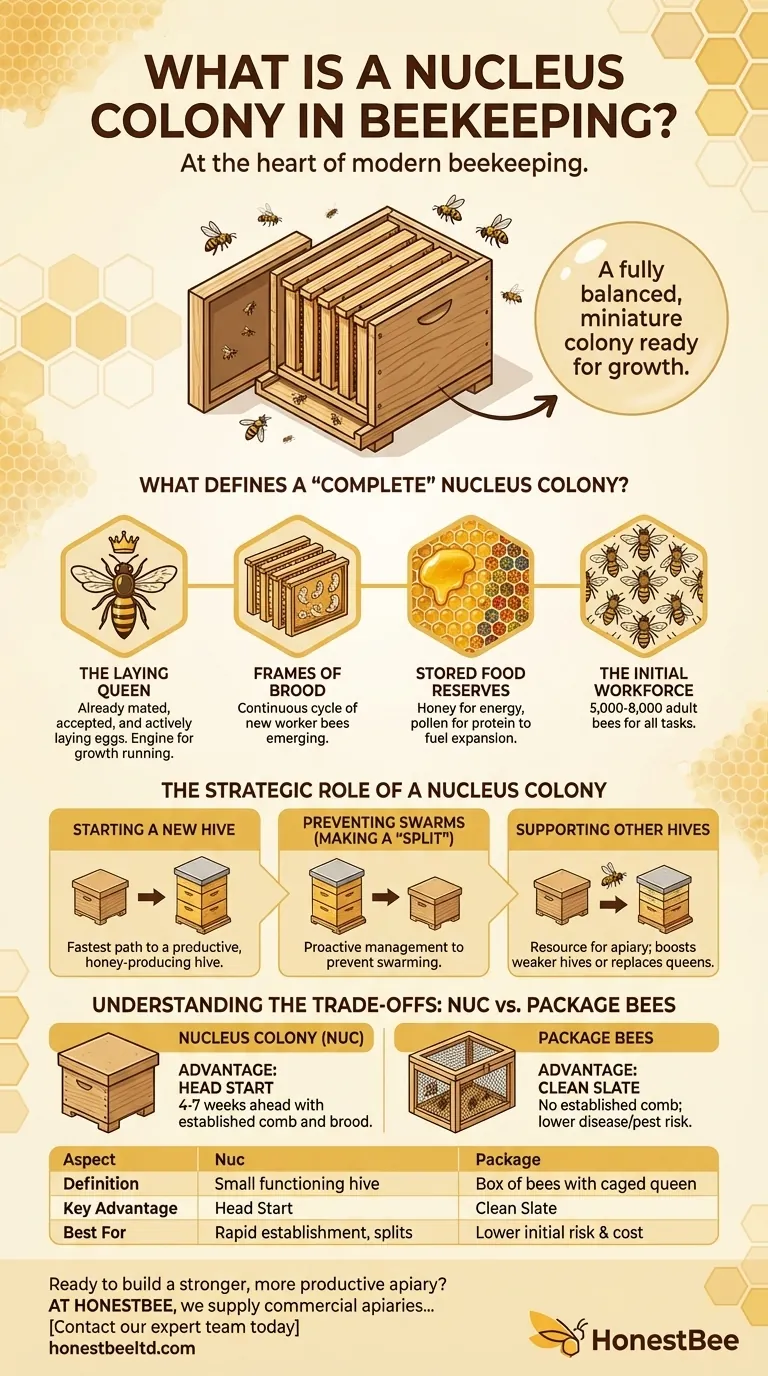
Related Products
- 5 Frame Wooden Nuc Box for Beekeeping
- Professional Galvanized Hive Strap with Secure Locking Buckle for Beekeeping
- No Grafting Queen Rearing Kit: System for Royal Jelly Production and Queen Rearing
- Jenter Queen Rearing Kit Complete Set for Bee Breeding
- Nicot Queen Rearing Kit for Beekeeping and Grafting in Nicot System
People Also Ask
- What are the benefits of moving nuclei around the apiary? Master Strategic Hive Management
- How many frames does a typical wooden nuc box hold? A Guide to Choosing the Right Size
- What is a common feature of many 5-frame nuc boxes? The Integrated Feeder for Efficient Colony Growth
- When can nucleus colonies (nucs) be created? Optimal Timing for Apiary Growth and Survival
- What is the advantage of overwintering a nucleus? A Strategic Asset for Beekeeping Success


